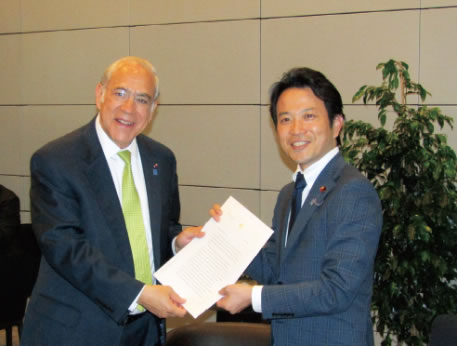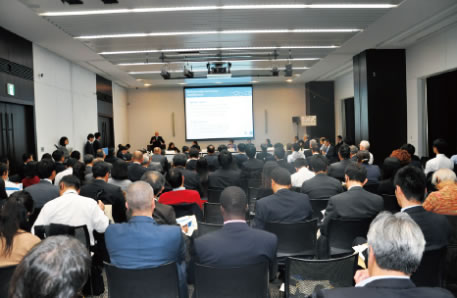ODA Topics 02
Japan’s Return to the OECD Development Centre

Then Parliamentary Vice-Minister for Foreign Affairs Masakazu Hamachi hands over the letter stating Japan’s return to the OECD Development Centre to Mr. Gurría, Secretary-General of the OECD in June 2016.
Proposed by U.S. President John F. Kennedy in May 1961, the Organisation for Economic Co-operation and Development (OECD) Development Centre was founded in 1962 as a sub-organization of the OECD. Although the OECD is an organization comprised of developed nations, the OECD Development Centre has a different character. It is positioned as a think tank, in which developing and emerging countries and OECD member countries participate on an equal basis, engaging in policy dialogues based on knowledge sharing and cases relating to development issues. (Its members comprise 27 OECD members and 24 non-OECD members.)
In recent years the global economy has experienced major changes and the proportion of emerging economies in the global economy has increased dramatically. Furthermore, development challenges have become diverse and complex thus the environment over development has also changed. The OECD Development Centre plays an important role in linking developing and developed countries and conventional and emerging donors.
Japan joined the OECD Development Centre at the time of its founding, but withdrew in 2000 due to issues such as governance of the Centre. However, in recent years, governance of the Centre has been improved and the number of newly participating countries has increased. In addition, the Centre’s analysis and proposals are highly appreciated so its influence has also grown. Furthermore, in light of the changing environment over development challenges, given that the Centre is capable of providing a forum for developed, developing and emerging countries to come together and engage in vigorous discussions on an equal basis, it is considered that the Centre is an important organization for dealing with various development challenges.
In 2016, Japan therefore decided to return to the Centre. In June that year Mr. Masakazu Hamachi, then Parliamentary Vice-Minister for Foreign Affairs, who was attending the OECD Ministerial Council Meeting held in Paris, France, delivered a letter from Mr. Fumio Kishida, Minister for Foreign Affairs of Japan to Mr. Angel Gurria, Secretary General of the OECD. As a result, Japan, as the largest financial contributor, returned to the Centre after 16 years’ absence.
In December 2016, as the first event to be held following Japan’s return to the Centre, the Ministry of Foreign Affairs (MOFA) of Japan and the Centre jointly organized an international seminar, titled “Global Development Trends and Challenges Emerging in Asia: Making the most of the OECD Development Centre.” Approximately 140 participants attended the seminar, including officials of the OECD Development Centre and Japanese ministries, agencies and other institutions, as well as experts, representatives of business, civil society, and diplomatic missions in Tokyo.
The seminar was attended by Mr. Kiyoshi Odawara, Parliamentary Vice-Minister for Foreign Affairs of Japan, and Mr. Mario Pezzini, the Director of the OECD Development Centre on behalf of the co-organizers. Keynote speeches were given by Mr. Toshihiro Nikai, the Secretary General of the Liberal Democratic Party of Japan and Mr. Shinichi Kitaoka, the President of JICA. The seminar included presentations by commentators and vigorous exchanges of opinions among participants, including various experts, which served to advance understanding on the initiatives of the OECD Development Centre, the necessity to strengthen the OECD’s relations with Asia and the role that Japan should play. The seminar represented a major step in further strengthening relations between the OECD and Asia in the future.
To date Japan has stood at the forefront of development trends, having long emphasized that development challenges must be tackled not through governmental ODA alone, but also with the cooperation of various actors, including the private sector, NGOs and civil society. By returning to the OECD Development Centre Japan will be able to share the development experiences of Asian countries with the world through the Centre and contribute to the development of countries around the world that are still struggling with poverty.
Furthermore, the knowledge, analytical skills and policy proposals of the OECD Development Centre will also provide beneficial tools for Japan and Asia to address the various challenges and work to accomplish quality growth. Strengthening links between the OECD and Asia will serve to create tremendous mutual benefits.

The international seminar “Global Development Trends and Challenges Emerging in Asia: Making the most of the OECD Development Centre” held in Tokyo on December 19, 2016
As a bridge between Asia, the global growth center, and the OECD, Japan will contribute and cooperate actively with the activities of the OECD Development Centre and work to further enhance the Centre’s links with Asia. In particular, Japan will work together with the Centre in the rapidly growing emerging economies of Asia to respond to various challenges, including the promotion of quality infrastructure investment and the advancement of regional integration. In July 2016, Ms. Naoko Ueda, former Representative of the Government of Japan to the Council of the International Civil Aviation Organization (ICAO), was appointed as Deputy Director of the Centre.
